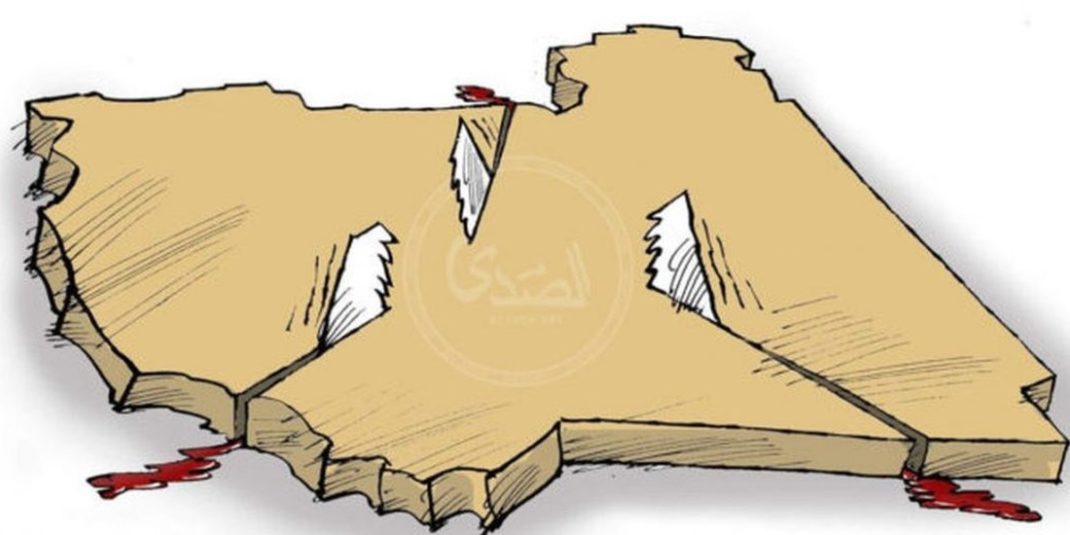By Jonathan Ruhe
 ‘Lead from behind’ has failed in Libya. The US must lead from the front to prevent a destabilizing deal between rival factions dominated by Russia and Turkey.
‘Lead from behind’ has failed in Libya. The US must lead from the front to prevent a destabilizing deal between rival factions dominated by Russia and Turkey.
Today, Turkey and Russia stand on opposing sides of the next battle line in Libya’s escalating civil war. But even if they trade blows over the strategic coastal city of Sirte and the nearby airbase at al-Jufra, it remains highly likely that they will ultimately divide the country between themselves, with troubling implications for American interests and regional stability.
Libya’s geography and history are not its destiny, but they shape its current conflict. One of General Erwin Rommel’s lieutenants observed how the country’s sheer scale and wide-open terrain made it simultaneously a tactician’s paradise and a logistician’s hell. World War II in Libya bore that out, with German and British forces rapidly advancing hundreds of miles before grinding to a halt.
These physical features intertwine with Libya’s historical divisions. For millennia before its modern incarnation as a nation-state, Libya’s two coastal population centers were cleaved into politically distinct eastern and western halves, separated by the Gulf of Sirte and expanses of desert.
They were first split between the ancient Ptolemies and Carthaginians, then between the Latin western and Greek eastern Roman Empires, before being carved into separate Ottoman and then Italian provinces into the twentieth century.
After World War II the Allies seriously contemplated halving the country again, and when Libya became a federalized state in 1951, the capital alternated between Tripoli in the west and Benghazi in the east.
Libya’s civil war today reflects this historical geography. On a map, it mirrors the country’s longstanding divide, pitting the Tripoli-based Government of National Accord (GNA) in the west against the Tobruk-based Libyan National Army (LNA) in the east.
Turkey backs the Muslim Brotherhood-affiliated GNA with troops and advanced weaponry; Russia, Egypt, UAE, France and others do likewise for the LNA.
Geography also helps explain the conflict’s stalemated state. Last year, the LNA’s offensive to capture Tripoli and end the civil war by force made big gains before finally halting around the capital’s outskirts. Overextended, these troops then made easy targets once Turkey intervened militarily earlier this year.
As in World War II, the battle lines lurched suddenly and drastically as the LNA retreated long distances to the next viable line of defense, around Sirte and al-Jufra in central Libya, along the country’s unofficial historical east-west seam.
Now the conflict awaits its next phase. Turkey announced it must control both points while Russia, Egypt and others declared this a red line and began flooding reinforcements into eastern Libya.
But regardless of what’s next for Sirte and al-Jufra, the country’s existing east-west gulf likely will be reinforced. Squaring off against Russia, Egypt and possibly others, any new Turkish offensive would face much stiffer opposition than its previous operations.
Moreover, while capturing these sites would lay Libya’s “oil crescent” at Turkey’s feet and would force the LNA to retreat long distances once again, even then Ankara would face the same problem that bedeviled armies in Libya before it: how to sustain combat power at the end of lengthening, vulnerable supply lines while its enemies’ lines shorten with every retreat.
Meanwhile Moscow seems disinclined to try to reverse Turkey’s gains to date, suggesting satiation with its foothold in eastern Libya.
Thus, no matter who holds Sirte and al-Jufra, both Turkey and Russia would be able to maintain strategically vital beachheads in Libya that threaten key U.S. interests.
Turkey already controls sufficient territory for a permanent military presence there, including naval bases to support ships exploring for natural gas in the waters defined by its destabilizing maritime boundary agreement with Tripoli.
By securing these advances in the first place, Ankara also notched a victory for its interventionist policy supporting Islamist governments regionwide.
Combined with its air and naval bases in Syria, similar infrastructure in Libya would further Russia’s southeastern encirclement of NATO and potentially pull Egypt away from America’s orbit.
With or without Sirte and al-Jufra, there is also a danger Moscow might accede to Ankara’s vast claims off Libya’s coast, thus threatening U.S. interests in developing the region’s energy resources as alternatives to Russia.
And whether or not they clash in Libya, the risk remains that Turkey and Russia eventually agree to determine the country’s future together, like they already do in Syria.
Yet the United States continues its failed “leading from behind” policy. As the Jewish Institute for National Security of America proposed in a recent report, Washington must appoint a Special Envoy for the Eastern Mediterranean to restore American leadership in pursuing a negotiated solution to the Libya conflict, which Europe and others lack the diplomatic leverage or credibility to devise.
Building off existing efforts by Greece, Cyprus, Israel and Egypt, he or she also should foster greater cooperation with and among our regional partners to balance Turkey and Russia.
A major battle looms in Libya, but the United States shouldn’t wait to begin addressing the worrying implications for national security.

***********
‘Dangerous adventure’: Turkey warns Egypt over Libya invasion
At Istanbul meeting, Russia and Turkey agree to push for a ceasefire but Ankara says eastern commander must retreat.
Turkey and Russia agreed on Wednesday to press for a ceasefire in war-ravaged Libya, but Ankara said the leader of the eastern forces was illegitimate and must withdraw from key positions for a credible truce to take hold.
Moscow and Ankara are among the main power brokers in Libya’s conflict while supporting opposing sides. Russia backs the eastern-based forces of renegade military commander Khalifa Haftar, while Turkey has helped the Tripoli-based Government of National Accord (GNA) repel Haftar’s attempt to storm the capital.
“We’ve just reached an agreement with Russia to work on a credible and sustainable ceasefire in Libya,” President Recep Tayyip Erdogan’s top security adviser, Ibrahim Kalin, told Reuters news agency.
Kalin said any deal must be based on a return to what he said were the Libyan front lines in 2015, requiring Haftar’s forces to pull back from the strategic city of Sirte – gateway to Libya’s eastern oilfields – and al-Jufra, an airbase near the centre of the country. “For the ceasefire to be sustainable, Jufra and Sirte should be evacuated by Haftar’s forces,” Kalin said.
Battle for Sirte
Turkish-backed forces allied with the UN-recognised government in the capital are mobilising on the edges of Sirte and have vowed to retake the Mediterranean city along with the inland al-Jufra airbase. The United States has said Moscow sent warplanes to al-Jufra via Syria to support Russian mercenaries fighting alongside Haftar’s self-styled Libyan National Army (LNA). Russia and the LNA both deny this.
Egypt, which also backs the LNA, has threatened to send troops into neighbouring Libya if the GNA and Turkish forces try to seize Sirte. The Egyptian parliament on Sunday gave a green light for possible military intervention. Kalin said any Egyptian deployment in Libya would hamper efforts to end the fighting and would be risky for Cairo. “I believe it will be a dangerous military adventure for Egypt.”
Egypt’s Foreign Minister Sameh Shukry said on Wednesday achieving a political solution in Libya requires a “firm” response to “extremists” and foreign interference, which “not only threaten Egypt’s interests but also the security of Mediterranean countries”. He noted a peace proposal announced in Cairo last month aimed at stabilising Libya and eliminating armed fighters and militias in the oil-rich country.
The proposal announced by President Abdel Fattah el-Sisi included a ceasefire and a new elected presidential body representing the three Libyan regions. The east Libya camp accepted the proposal, dubbed the Cairo Declaration, while the Tripoli-based administration rejected it.
Wednesday’s joint agreement by Turkey and Russia on their ceasefire efforts included a call for measures to allow humanitarian access to those in need and efforts to promote political dialogue between the rival Libya sides.
But Kalin said Haftar had violated previous truce deals and was not a reliable partner, suggesting other figures in the east should play a role. “We don’t take [Haftar] as a legitimate actor anyway,” he said. “But there is another parliament in Tobruk. There are other players in Benghazi. The negotiations will have to take place between them.”
The LNA has itself sent fighters and weapons to bolster its defence of Sirte, already badly battered from earlier phases of warfare and chaos since the 2011 revolution against longtime autocrat Muammar Gaddafi.
Russia’s foreign ministry said it backs a ceasefire and political talks that would culminate in united governing authorities. Russia has received senior delegations from both sides of the Libyan conflict in Moscow and tried and failed to get Haftar to sign up to a ceasefire agreement.
‘All kinds of bullying’
Shukry’s comments came in separate phone calls with France’s Foreign Minister Jean-Yves Le Drian and German Foreign Minister Heiko Maas, according to a statement from Egypt’s foreign ministry. Erdogan, meanwhile, chaired a high-level security meeting that focused on Libya on Wednesday.
A statement released at the end of the National Security Council meeting said Turkey would not hesitate to take all steps necessary against “all kinds of bullying” taking place in Libya. The council promised to “stand by the people of Libya against any tyranny”.
Egypt, the United Arab Emirates and other foreign powers have provided Haftar’s forces with critical military assistance. Russia also sent hundreds of mercenaries through the Wagner Group, a private military company. Libya was plunged into chaos when a NATO-backed uprising in 2011 toppled Gaddafi who was later killed.
_____________





